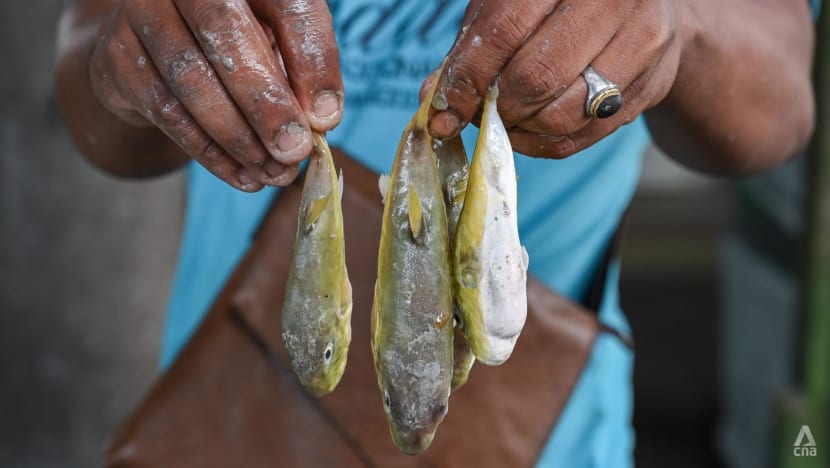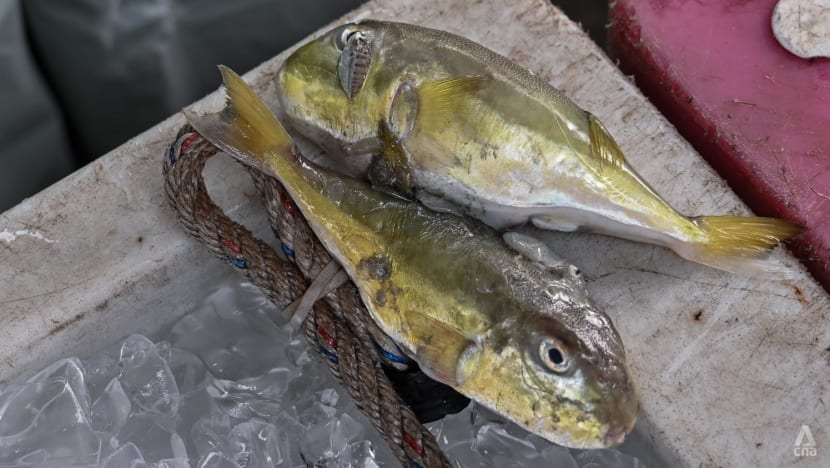Pufferfish poisoning in Malaysia: Daughter of couple who died calls for more awareness, legal action

A fisherman shows some of the pufferfish that were caught in his fishing nets. (Photo: CNA/Fadza Ishak)
KUALA LUMPUR: The daughter of two elderly people in Malaysia who died after eating pufferfish has called for more awareness on the sale of the fish, as she pushes for the government to prosecute those responsible for their deaths.
Ms Ng Ai Lee, 51, said she hopes that there will be no repeat of the incident involving any other families.
“I hope that this sort of tragedy ends with my parents. We cannot afford to have another incident like this again. It is too painful to see your loved ones passing in this manner,” she told CNA in a phone interview.
Ms Ng’s parents - who were from Kampung Chamek in Paloh, Johor - died after eating pufferfish on Mar 25. It was the couple’s first time consuming the fish, Ms Ng said.
Her mother - Mdm Lim Siew Guan - began to shiver and experienced shortness of breath shortly after eating the pufferfish. Her father, Mr Ng Chuan Sing, displayed the same symptoms about an hour later.
Mdm Lim died that same day, while Mr Ng died two weeks later on Apr 8.
Ms Ng - the fifth among seven siblings - told CNA that she hopes her parents’ deaths could set a precedent for the case to be brought before the courts. This is so that the seller who sold the pufferfish to her parents, as well as those involved in the supply chain, can be prosecuted.
“From a legal standpoint, we need to have a precedent and I hope the case can be brought to court,” the chief financial officer of a publicly-listed company said.
She added: “I hope the government takes action … not just (against) the fish seller but the whole supply chain and whoever is responsible for this,” she said.
Ms Ng told CNA that a post-mortem was conducted on her mother to ascertain the cause of death despite a Chinese taboo that the body needs to be “complete” when cremated.
“I managed to convince my brothers and family (to conduct a post-mortem). I couldn’t let this just end this way. Only through a scientific check, can it lead to a public prosecution,” she said.
Ms Ng recounted that she was able to confirm with her father that he had bought the pufferfish for the first time before he became unconscious.
She said that her father did not know that the fish was poisonous.
“My mum is a careful person … when it comes to their diet. I don’t think they were willing to take a risk if they knew it was poisonous,” Ms Ng said, claiming that her parents had bought other fish from the same seller before.
“If the government is able to charge the seller, the law is sufficient. But if she cannot be charged, the law is insufficient and the law needs to be changed. I hope the public don’t forget this incident,” she said, while urging suppliers to be ethical and not sell fish that contain poison.
Malaysia’s health director-general Dr Noor Hisham Abdullah said in a Facebook post on Mar 30 that pufferfish which contain dangerous toxins are not allowed to be sold, in accordance with the Malaysian Fisheries Development Authority Act 1972 and the Food Act 1983.
Dr Noor Hisham also said that between 1985 and Mar 2023, there were 58 pufferfish poisoning incidents reported in Malaysia involving 18 deaths.
When asked by CNA to comment on Japanese restaurants that sold pufferfish, Dr Noor Hisham clarified that those with a licence from the Ministry of Health’s Food Safety and Quality Division were allowed to sell it.
According to the health ministry, pufferfish contains a poison known as tetrodotoxin that attacks the nerves and could eventually cause death.
It said that the poison is located in the ovaries, bile, liver, intestine and the skin of the pufferfish and that in the process of cleaning the fish, the flesh could be contaminated with the poison.
PUFFERFISH CAUGHT OFTEN THROWN BACK OUT TO SEA
A check at several coastal towns in Selangor by CNA found that pufferfish were not readily available for sale.
At the Sungai Yu fishermen market in Kuala Selangor about an hour-and-a-half drive from downtown Kuala Lumpur, several fishmongers said that pufferfish are often thrown back out to sea when they are caught in the nets.
Mr Rasidi Tumin, 50, who has been fishing for almost 40 years said that the fish was commonly found among shrimps.
“If it ends up in the nets, I will throw it away. Sometimes, I will bring them back when there is a request for it.
“People use it to get rid of termites. They will plant it in the ground, especially at the construction sites of new houses,” he said, adding that he would give pufferfish away for free to those who requested it.
Mr Rasidi told CNA that he has eaten pufferfish a few times, but only after it was cooked by a friend who knows how to prepare it.
“It is delicious, but I definitely wouldn’t make it on my own nor would I sell it to anyone for consumption,” he said.
Similarly, fishmonger Yasir Muhammad said that he would only give pufferfish to those who requested it to be put in the ground, citing the beliefs of the elders.
“The fishermen know that this fish is poisonous and cannot be eaten. The fisheries (department) also have educated us on the dangers of this fish,” the 60-year-old said.

Fisherman Mohd Ridzuan, 34, who is from Kampung Tok Adam in Tanjung Karang showed CNA pufferfish which ended up in a pile of other small fishes that were cast in his nets.
The pufferfish and these other fishes would end up being processed as fish food (pellets), said Mr Ridzuan.
He added: “There are many versions of this pufferfish and sometimes there are just so many of them that end up in the nets. We know better than to eat it or to sell it for human consumption.”
A check at several shops selling fresh seafood in the neighbouring Kampung Bagan Pasir found that no one there sold the fish.
Fishmonger Chong Jin Yao, 20, said that there was no demand for pufferfish in the village.
“The Japanese know how to slice it and prepare it safely to be eaten. I will never dare consume it. No one here asks for it,” he said.
Checks by CNA also found that pufferfish were being sold online, but only as pets. The sellers said that the fish was safe to keep in an aquarium but were not for consumption.
Read this story in Bahasa Melayu here.


















